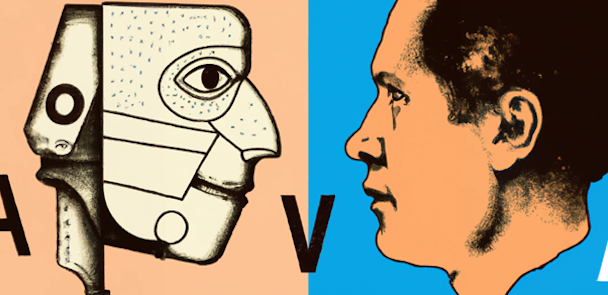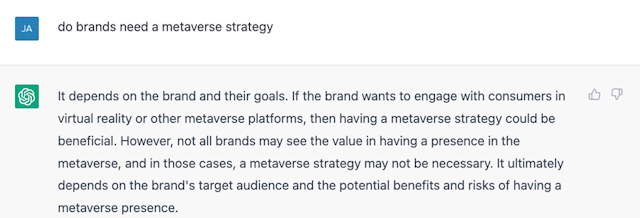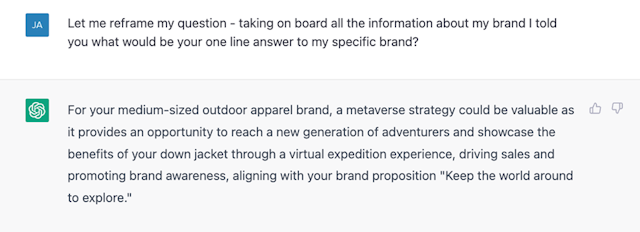Can AI really replace brand strategists?
There’s been no shortage of recent handwringing about generative AI technology taking your job. Here, for The Drum’s AI and web3 deep dive, Jellyfish’s James Croft takes a hard look at whether the artificial interlopers will be any match for… himself.

Can generative AI replace human brand strategists? Jellyfish’s James Croft investigates / Image generated by Dall-e with some additional human artworking, credit: James Croft
This article started with the question: do brands need a metaverse strategy?
My professional response would be a series of qualifying questions: what challenges does the brand currently face? Who is its target audience? What added value or experience can it offer?
This is by no means an exhaustive list, but in most cases, the unsure or mixed responses we can expect to these questions would reinforce my view that a strategy of considered abstinence, active observation (neither technophilic or technophobic), and longer-term planning is sensible for most.
This doesn’t seem to be a niche opinion. Yes, Nike has reportedly generated $1.29bn in secondary market transactions over the last 12 months from metaverse activities. And yes, Gucci sold a virtual Dionysus bag for $4,115 (the physical version costs only $3,400). But a 2022 survey of European and American companies found that 68% believe it will take another five years to see a boom in the metaverse.
Advertisement
A professional existential crisis in a virtual world
I must admit that in this rapidly evolving virtual future, I’ve been experiencing something of a professional existential crisis thanks to the recent hype around artificial intelligence (AI).
What’s happening in this space is both fascinating and mind-boggling. Once the potential of this tech is realized, it will surely have seismic effects in more ways than we can comprehend right now.
But how is AI going to impact the advertising and marketing industry? And can a bot do the job of a strategist? Should I start considering a career swap now?
Tentatively but curiously, I posed my question to ChatGPT:

While the considered point about audience, objectives and cost-benefit seemed a fair response, the point about needing a strategy (or not) seemed pretty obvious. Thanks, ChatGPT – my job is safe so far.
Advertisement
Curiosity killed the cat, but what about ChatGPT?
My curiosity got the better of me: I wanted to see how ChatGPT would handle a deeper line of questioning. I added some hypothetical context to my questions, posing as a medium-sized outdoor brand looking to grow my business and adding real-life details (budget, target audience, and objective) that I would expect when receiving or writing a strategy brief.
Overall, I was pretty impressed with the chatbot’s answers. It gave balanced and considered responses about how my imaginary brand might consider entering this space, providing a range of credible ideas and suggestions (albeit not the most imaginative ones, until I pushed in on a particular idea).
When I went down a rabbit hole to push it for more specifics (like what budget I might be looking at) I smirked at its ‘it’s-hard-to-give-you-a-figure-without-knowing-more-detail’, agency-style response. It diplomatically caveated numbers and scope, just like an agency would.
Suggested newsletters for you
Should strategists clear out their desks?
Quite simply, no. While I was impressed by some of the responses, the fact remains that it required human input to ask and interrogate at every step in the line of questioning. And the refinement of answers came from reviewing, shortlisting and pursuing lines of thinking that I thought credible – an ability I believe only possible from accumulated experience and knowledge.
Where I do see an application for ChatGPT, right now, is helping to brainstorm ideas, and to challenge or expand thinking when posed with strategic questions. A big part of our roles requires us to quickly immerse and understand a category, topic or product – which can be challenging if you haven’t been exposed to these before. ChatGPT can help to quickly gather insights and knowledge. This application was something my colleagues shared too when I picked their brains.
Beware, though, AI’s general shortcomings: how recent its knowledge base skews, and the fact bots can output articulate answers that might not be true.
To bring this experiment full circle, I asked ChatGPT to give me a one-line summary – to which it gave a relatively conclusive answer.

So, if you’re a medium-sized outdoor brand, launching a new down jacket, and fancy organizing a virtual expedition – then ChatGPT has spoken. Otherwise, maybe trust my human response.
For more hot takes and cold hard looks at the emerging tech landscape, check out The Drum’s deep dive on AI to web3.
Content by The Drum Network member:

Jellyfish
Jellyfish is a marketing performance company for the platform world, where success demands a creative, multi-platform mindset. We help brands thrive, by navigating,...
Find out more
